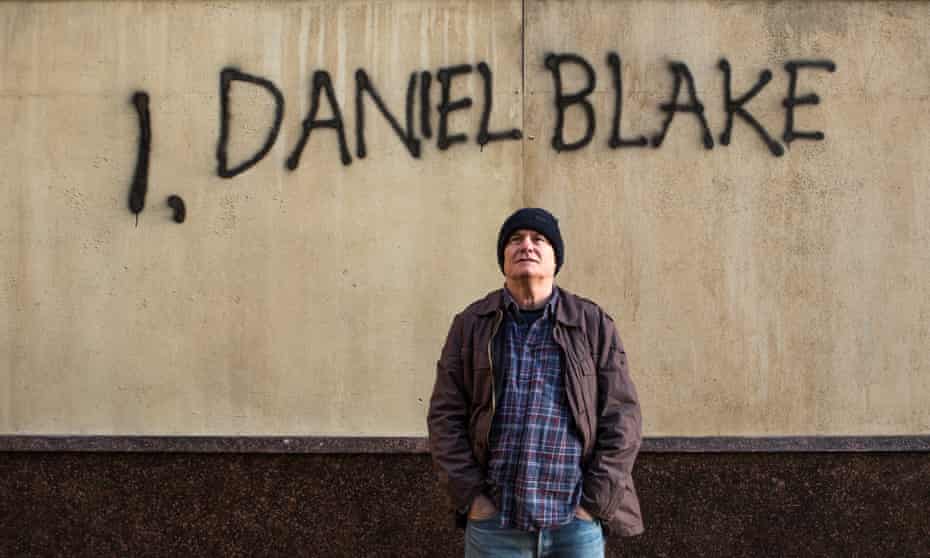Accusations that the film is inaccurate are part of the ongoing attempt to dismiss what is being done to vulnerable people in Britain’s toxic social security system.

‘The culture that says that, because they are on benefits, anyone who is unemployed, disabled or has mental health problems is naturally a shirker and a liar.’ Photograph: Joss Barratt/Entone Group
It is reflective of the toxic climate that has developed around “welfare” over recent years that there still exists any doubt over the awful realities of this country’s benefit system. Thinktanks, charities, academics and even the Department for Work and Pensions’s (DWP) own commissioned reports, provide the evidence: whether that is data from the Trussell Trust that shows benefit delays and sanctions account for almost half the people who come to them for emergency food parcels, a rightwing thinktank hired by the DWP finding that Jobcentres are imposing benefit sanctions in such a way that the most vulnerable claimants don’t understand them, or Whitehall’s official spending watchdog, the National Audit Office, concluding there is no evidence that stopping someone’s benefits even works.
Jennifer Lindsay, 41, from Wembley, London, has severe weakness in her ankles – often so bad she needs to use a wheelchair – and had to claim jobseeker’s allowance (JSA) in late 2014 after she was made redundant from her job as a local government youth worker. As well as conducting job searches, she tells me she had to sign on weekly at the jobcentre or risk sanction. But, without access to local public transport or money for a taxi, she had to walk a mile to get there. With her weak ankles, that took at least an hour.
When she got to the jobcentre, it then took another 30 minutes to get up the stairs to be able to sign on. The building had lifts, but jobcentre staff told her that, as they weren’t for “public use”, she should arrive a bit earlier and “take her time on the stairs”. “It was particularly galling to watch presumably non-disabled staff use [the lifts] as a matter of course,” she says. As a result, she would often have to spend the next two days in bed to physically recover. Jennifer got a job in the end, but has just found out that the funding for her current post has been cut and is scared of needing JSA again. “I just can’t face going back to the jobcentre,” she says.
Anthony Costello’s grandad and carer died when he was 18. Anthony had no money – his part-time job at KFC ended due to over-staffing and, since he was at university, he wasn’t eligible for housing benefit to pay the rent on his grandad’s flat. Anthony thought the jobcentre would help him but, after only one week of receiving benefits, he had his money stopped. Why? Because he had looked for jobs on websites that weren’t the jobcentre’s own site. The strain of the sanction led him to developing depression to such a degree that a week after getting his benefits back, he missed a job interview for an unpaid work scheme – a five-hour return journey away – because he couldn’t get out of bed. His benefits were promptly sanctioned for another six weeks. Unable to cope with the jobcentre, Anthony stopped claiming JSA and subsequently lost his flat. With no home and sleeping on friends’ sofas, he had to give away his late grandparents’ belongings: furniture and clothes. “Everything but their photos,” he says.
From the moment I, Daniel Blake first opened, rightwing critics questioned whether the cruel and incompetent benefit system endured by Loach’s protagonist “rang true”. But it would be to miss the point of any of this to think that disputes over the film’s accuracy have ever been about the film itself. Rather, it is part of the ongoing attempt to dismiss what is being done to those put through the social security system – and the culture that says that, because they are on benefits, anyone who is unemployed, disabled or has mental health problems is naturally a shirker and a liar.
Dr Daniel Edmiston at the University of Oxford – who has researched welfare reform for the past four years – tells me how he has found an expectation in Jobcentre Plus that claimants are “subservient, compliant and grateful”. Many of the people he interviewed were so worried that their benefits were subject to the whims of jobcentre staff that they actively moderated their behaviour to be more pleasing. Others who didn’t risked severe financial hardship; one woman who verbally confronted her benefit adviser, and was subsequently sanctioned, ended up searching bins for food.
The proof of how warped the benefit system was becoming was available as far back as 2012 – not by data or anecdotes – but simply by looking at the government’s own policies: rapidly accelerating faulty “fit for work” tests, making it legal to quadruple how long they could stop the benefits of a jobseeker for making a mild error, and taking more money from sanctioned disabled and chronically ill people.
Five years on, people who need the safety net of benefits are still enduring the consequences. It’s surely time to believe them.
This article was originally published on: https://www.theguardian.com/commentisfree/2017/feb/16/daniel-blake-realistic-life-benefits
